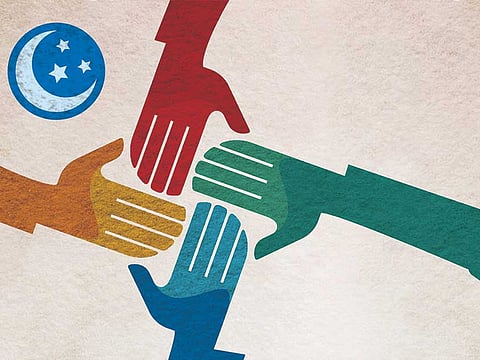An Islamic economy that is all inclusive
Sharia precepts can be turned into the pillars for a truly ‘Just Society’

The Islamic economy strives for justice, fairness, trust, honesty, integrity and a balanced society. It is characterised by the same ethical principles and social commitment envisioned in the ethical and moral framework of the Sharia.
The principles of halal (permissible) and haram (prohibited) provide a filter for actions taken by individuals in the society and form the legal basis for the Islamic economy.
Every economic system is based on some foundational premises, or values. Secular economics is value-neutral but even being so is a value in itself.
As such it is flexible in interpretation and practice and, therefore, open to abuse. Islamic economics, on the other hand, must observe the teachings of the Sharia, which cannot be violated at any point in time. As a result a primary goal of Islamic economics is to promote public interest and prevent harm.
During the Holy Month of Ramadan, the attention of Muslims will turn to re-evaluating our lives; making peace with those who have wronged us; strengthening ties with our family and friends and doing away with bad habits — essentially taking time to clean up our lives, our thoughts, and our feelings.
Ramadan also brings about a special feeling of closeness.
What has this to do with the Islamic economy? The answer can be summed up in two words — ‘Just Society’. For outside observers one of the most intriguing aspects of Islam is its constant emphasis on society, an emphasis that gains special importance during Ramadan. So pronounced is this aspect that some western scholars regard the ‘Just Society’ as the primary goal of the Islamic message.
In her book ‘Islam: A Short History’, Karen Armstrong asserts that the creation of a just society is the “chief duty” for Muslims, adding that “the experience of building such a society and living in it would give them intimations of the divine, because they would be living in accordance with God’s will.”
When His Highness Shaikh Mohammad Bin Rashid Al Maktoum, Vice-President and Prime Minister of the UAE and Ruler of Dubai, established the Dubai Islamic Economy Development Centre, he made it plain that development of the Islamic economy is not simply about trade or finance.
Just as important is the social welfare dimension, one in which the Islamic economy contributes to the overall well-being of society. And this can be best illustrated by the Salma initiative, the first non-discriminatory humanitarian project announced under the ‘Capital of the Islamic Economy’ umbrella that is aimed at making halal food-related aid more accessible and efficient.
As such, The Salma emergency food relief programme, a partnership between the Dubai Islamic Economy Development Centre (DIEDC) and the Awqaf Minors Affairs Foundation in Dubai and Noor Endowments is in line with both Sheikh Mohammad’s decree to establish Dubai as a hub of humanitarian aid and its vision to be the capital of the Islamic economy.
Salma taps into — and galvanises — the human spirit to help people at times of extreme need. It is open to all faiths, and gives to all faiths. What is required is nothing but the willingness to make a difference.
And it is that willingness to make a difference that lies at the heart of the work being done, at DIEDC, to create the right environment in which Muslims and non-Muslims can access an economic system that puts ethical practice and public interest front and centre.
In that sense, corporate social responsibility and a ‘Just Society’ have much in common; both seek to create a balance between societal welfare and companies’ focus on making profits.
The Islamic economy isn’t a universal panacea for the world’s economic ills. But the spirit — embodied in the ‘Just Society’ — that puts the well-being of others above the self, suggests that the Islamic economy can offer a robust alternative for those seeking products and services that have ethical and socially-responsible underpinnings.
The month of Ramadan will be an opportunity for those of us involved in the Islamic economy to ask ourselves “Is there a better way?” and to begin the process of finding solutions to global economic challenges that address societal needs beyond the bottom-line and deliver economics with a conscience.
The writer is CEO, Dubai Islamic Economy Development Centre.



